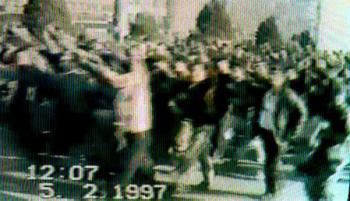State Violence Against Uyghurs: Remembering the Ghulja Massacre

For immediate Release
February 3, 2016 10:30am EST
Contact: Uyghur Human Rights Project +1 (202) 478 1920
https://uhrp.org/press-release/state-violence-against-uyghurs-remembering-ghulja-massacre.html
On February 5, 1997, Uyghur demonstrators in Ghulja took part in a non-violent protest calling for an end to religious repression and ethnic discrimination in the city. After violently suppressing the demonstration, Chinese authorities subsequently rounded up large numbers of Uyghurs suspected for their involvement. Human rights organizations documented a pattern of arbitrary imprisonment, torture in detention and unfair trials of those rounded up. For their alleged role in the events, several Uyghur participants were executed. Despite credible evidence describing state violence used against Uyghur civilians, the extrajudicial killings have been recast as “the beginning of active terrorism in the country.”
In the context of an aggressively promoted Chinese government narrative stating it faces a concerted terror threat in East Turkestan, the Uyghur Human Rights Project (UHRP) on the nineteenth anniversary of the Ghulja Massacre reminds concerned observers of China’s long record of conflating peaceful dissent with “terrorism.”
“The killing of unarmed civilians exercising their fundamental rights to expression and assembly in Ghulja on February 5, 1997 is a stain on the human rights record of the Chinese government. The absence of a genuine investigation into the brutal actions of the Chinese security forces demonstrates the kind of contempt the state holds for Uyghur lives,” said UHRP Director Alim Seytoff in a statement from Washington, DC. “It is just as concerning that nineteen years after the massacre in Ghulja, the Chinese government is still distorting peaceful expressions of Uyghur dissent as ‘terrorism.’ The international community has a responsibility to guarantee the rights of the Uyghur people as China intensifies its repression through an alleged ‘counterterror’ framework.”
UHRP believes a vague definition of “terrorism” and restrictions placed on reporting “terror incidents” contained within a new Counter-Terrorism Law legitimizes the use of excessive force against Uyghur civilians expressing peaceful dissent over government policies. Furthermore, the new legislation prevents and punishes commentary, domestic and foreign, critical of the repression and of “counter-terror” measures in the region. The cases of Uyghur academic Ilham Tohti, Xinjiang Daily editor Zhao Xinwei and French reporter Ursula Gautier demonstrate Beijing’s zero tolerance for such questioning.
Among the policies that prompted the 1997 demonstration in Ghulja was the prohibition on traditional Uyghur gatherings known as meshrep. Chinese authorities banned meshrep just prior to the demonstration, despite the fact that Uyghur communities were using the meshrep to successfully fight alcohol and drug abuse among Uyghur young people.
As recently as May 2014, credible allegations emerged detailing how Chinese police opened fire on peaceful Uyghur demonstrators in Alaqagha, Aksu Prefecture. UHRP believes incidents such as the one in Alaqagha merit further investigation, as do reliable claims of state violence employed in Hanerik (June 2013), Seriqbuya (April 2013) and Elishku (July 2014).
See also:
Sign UHRP’s petition to release eight political prisoners including Abdurazzak Shamseden, who was imprisoned in the aftermath of the Ghulja Massacre in reprisal for his nephew’s participation in the protests:
https://www.change.org/p/chinese-president-xi-jinping-free-eight-uyghur-political-prisoners
Legitimizing Repression: China’s “War on Terror” Under Xi Jinping and State Policy in East Turkestan
https://uhrp.org/press-release/legitimizing-repression-china%E2%80%99s-%E2%80%9Cwar-terror%E2%80%9D-under-xi-jinping-and-state-policy-east
UHRP Interview with a Ghulja Massacre Protestor in Washington, DC, February 5, 2014
https://www.youtube.com/watch?v=4tgpjdDYGnE
Rebiya Kadeer’s Personal Account of Gulja after the Massacre on 5 February 1997
https://www.amnesty.org/en/documents/ASA17/001/2007/en/
Ghulja Massacre: https://www.youtube.com/watch?v=4RUCOrg2Pb0
